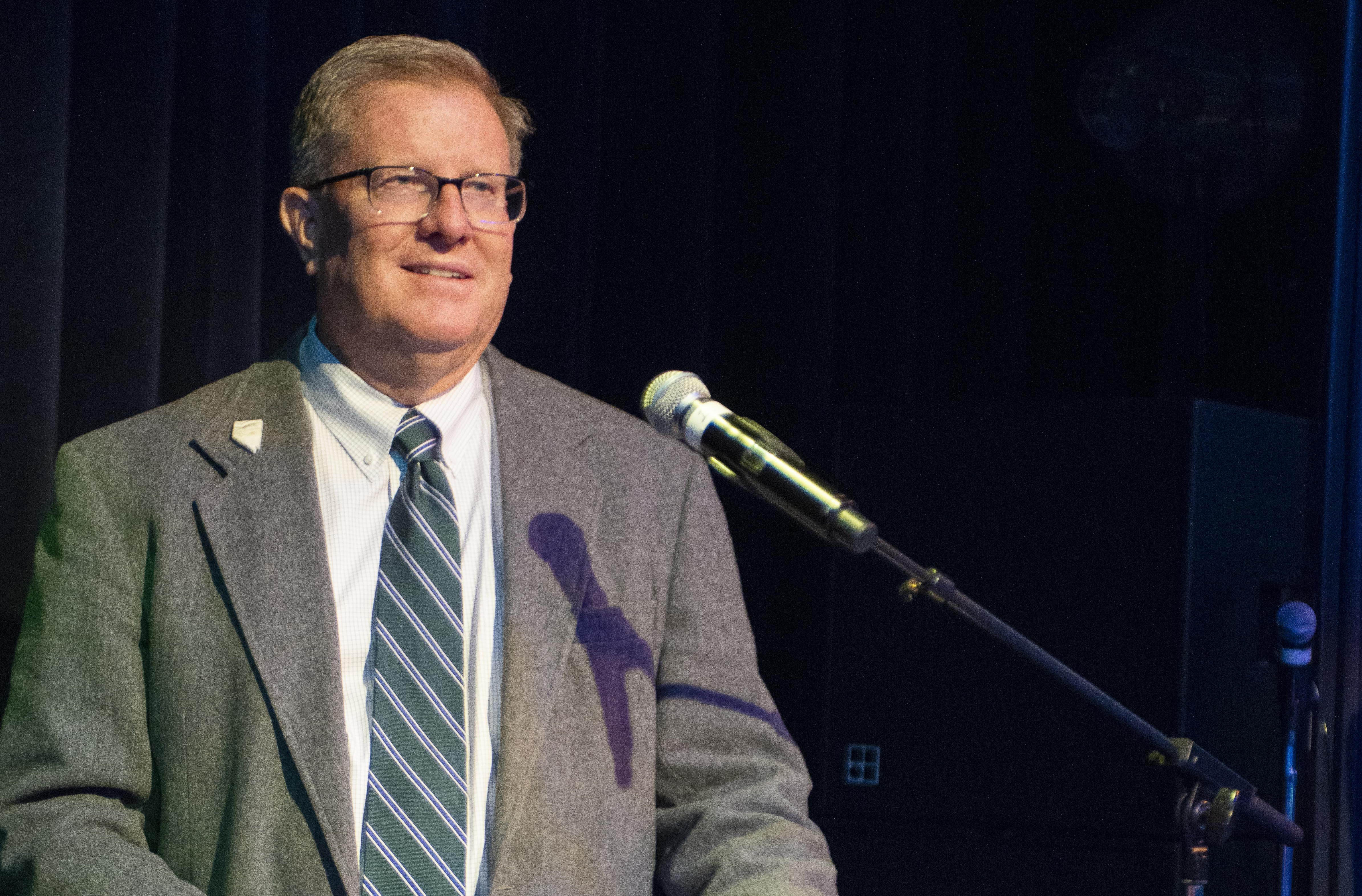5 Questions With Distinguished Alumnus Richard Perry

Richard Perry speaks from a podium (Photo courtesy of Richard Perry)
Richard Perry (Geology, ’81) fell in love with geology in community college while digging for fossils in the desert and studying the landscape of Death Valley. After earning his bachelor’s at Chico State, he earned his master’s at the University of Nevada, Reno, and has transformed his passion into a nearly 30-year career in the mining, water resources, and geothermal industries. Today, as the administrator of the Nevada Division of Minerals, he is one of eight distinguished alumni the University is honoring this fall. He spoke with us to reflect on his success, his career, and his Chico Experience.
When and how did you discover mining is what you wanted to do with your life?
I was a business major coming out of community college but I was also taking a geology class each semester for a minor. I loved geology and I loved being outdoors. I remember sitting in a cost accounting class in my second year at Chico State, and I told the professor I was changing all my classes. I just had an epiphany that the sciences were what drove me and where I needed to be. I became an economic geologist—Chico is one of the few universities in California that has an economic geology program—to study the wide field of how to extract minerals from the earth to feed society’s needs. There is an old saying: “If it isn’t grown, it has to be mined.”
What has been one of your greatest opportunities?
At Newmont [Mining Corp.], they offered me every assignment they thought I might be able to handle—plant engineering, grade control geologist, mill superintendent—and I worked my way up and eventually went overseas twice. Once was to start a mine in the Republic of Uzbekistan in the mid-90s. And in 1998, they had found an enormous copper deposit on the island of Sumbawa in Indonesia. I went over there as the first operations director to help get the mine started up. I took about 20 people out of Nevada with me, and we hired 3,500 Indonesians and trained them. Ultimately, we got that copper mine up and running, and received an award for the environmentally sensitive way that we did that. It set a standard in Indonesia.
How did your global experience shape your life?
I lived in Indonesia with my family in a little township for three years. We learned to speak the language and had many Indonesian friends. And we had monkeys and pythons and wild pigs and all kinds of different critters. It was like living in National Geographic for a while. I would recommend it to anybody who gets an opportunity to work in a developing country or any country outside the United States. It helps you understand other people’s points of view. It helps you appreciate the United States, and how we have evolved and made democracy work here after 250-something years. The systems we have in place, standards are of living, how we resolve disputes—you can’t take it for granted because in many countries out there, they have not gone through that evolution yet. That was very evident in Uzbekistani and Indonesia. And it gave me an appreciation of different religions and how they form the social fabric in a country like Indonesia. I had employees that were Muslim, Christian, and Hindu. They all got along well together, but that’s the social net in many of those countries. After being in Uzbekistan, it also shocked me at how communism had wiped out religion and how devoid its spirituality was.
What is your aspiration for the future of the mining industry?
That the industry continues to do a good job of environmental compliance. I was a metal miner my whole life. The things that were produced were gold, silver, and copper, and they are all needed by society—whether they are needed for jewelry or wiring in a Tesla. Someone has to produce it. We compete on an international stage, and many companies are not required to operate to the environmental and permitting requirements that the United States holds ourselves to. We are a net importer of far too many mineral commodities, and that creates a dependence on production in some very unstable parts of the world. We have global competitors who are trying to lock up as many of these commodities so they can control them. That is a risk to our country, and I would like to see our mining industry be a part of helping.
What has been the most rewarding part of your career so far?
I’ve had a lot of experiences and technical successes, but the most rewarding thing was always to see that the operation was safe, environmentally sound, and profitable so I could employ people so they had an occupation and could take care of their families—whether in Nevada, where I had 2,500 employees working in seven different locations, or in Indonesia, where we hired and trained 3,500 Indonesians from scratch. I remember when we hired the last 500 people in the program, we had 50,000 applications. Mining has a negative connotation in some circles, but people who work in it make a good living and most are not degreed professionals like me. In Nevada, the average wage of a miner is $90,000 a year, and the City of Elko is one of the rare bright spots in the economy where there is no poverty. And I think that’s kind of a testament to the industry that people don’t regularly hear.


